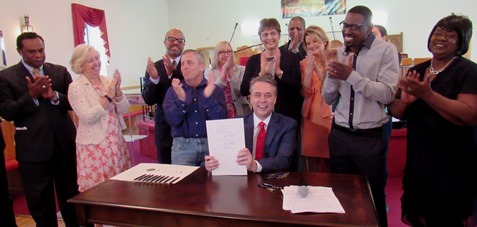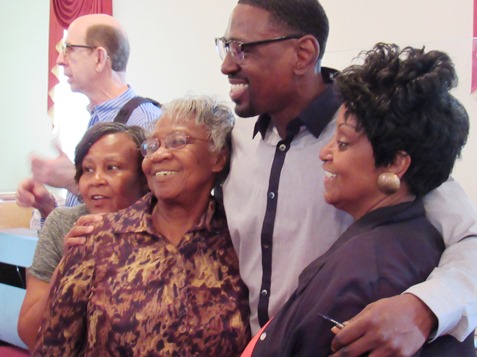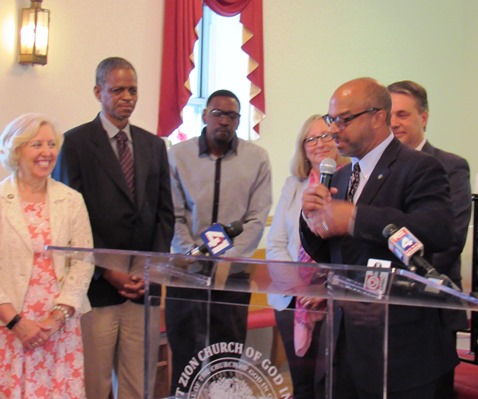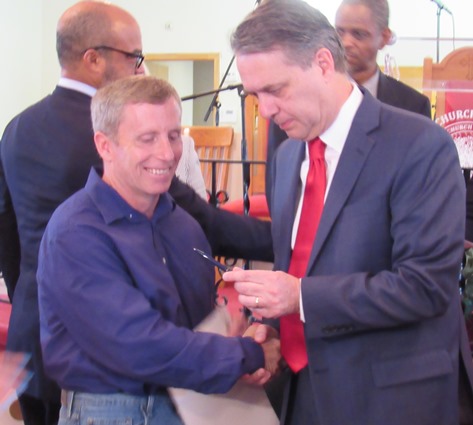
by Mary Rupert
Gov. Jeff Colyer signed a bill today compensating individuals who had been wrongfully incarcerated, apologizing to two individuals who had been exonerated and giving them hugs.
The bill signing at Mount Zion Church of God in Christ in Kansas City, Kansas, included two persons who have been exonerated after serving time, Lamonte McIntyre and Floyd Bledsoe.
“Wow – I can’t tell you how excited I am about this,” Lamonte McIntyre, who was exonerated in 2017 after 23 years in prison, said at the bill signing. With help from the Midwest Innocence Project, Centurion Ministries and attorney Cheryl Pilate, he was exonerated of a 1994 double homicide in Kansas City, Kansas. “I’m happy today.”
The law provides a fresh start for those who were wrongfully imprisoned in Kansas. Previously, those who were exonerated in Kansas were not given any compensation for the years they spent in prison. McIntyre said this new law will help him and a lot of people who were wrongfully incarcerated. He added he hoped other states could catch on.

“While nothing will ever get back the 16 years, the pain and the loss, but this morning, this is a great starting point,” Floyd Bledsoe, who was exonerated in 2015 after 16 years in prison, said. He was wrongfully convicted of a murder that took place in 2000. He was represented by the Midwest Innocence Project and the Paul Wilson Project for Innocence at KU School of Law.
A third Kansas person who spent 16 years in prison and was exonerated in 2017, Richard Jones, did not attend the bill signing. He was represented by the Midwest Innocence Project and Wilson Project for Innocence.
The new law is one of the strongest wrongful conviction compensation laws in America, according to Gov. Colyer. It gives $65,000 per year to those wrongfully imprisoned, plus $25,000 per year to those who wrongfully were placed on parole, probation or the sex offender registry. In addition housing, tuition assistance, social services, and state health care will be offered. Their convictions will be expunged. The bill also includes a provision for anyone who received a civil award or settlement to reimburse the state for the difference between the award and the state compensation.
“Let justice roll down like waters, and righteousness like an ever-flowing stream,” Gov. Colyer quoted from the Bible in his remarks, “and that is what we’re starting today.”

“Today is a momentous day for justice here in Kansas,” he said. When mistakes are made, which is rare, he said, it is their responsibility to do whatever they can to make things right.
“We believe in you, we apologize to you, we love you and we will make it right, and most important, thank you for what you are doing for all Kansans,” Gov. Colyer said to McIntyre and Bledsoe.
“Today we take a step back towards justice,” he said. The years taken cannot be given back, but the bill will make a large step to right wrongs, he said.
State Sen. David Haley, D-4th Dist., had introduced a wrongful compensation bill for about 10 years in the state Legislature before a bill on the subject passed this past session. Alvin Sykes, a human rights activist from Kansas City, Kansas, originally asked Sen. Haley to introduce the legislation.
Sen. Haley said that under the new law, these individuals who were wrongfully incarcerated would finally receive a portion of the liberty, their life that was stolen.

He said some estimates are that 8 percent of people currently incarcerated in America are there for crimes they did not commit. That could be as many as 800 in Kansas, he believes.
“It could be the waking nightmare for any of us,” he said.
“We have more work to do,” Sen. Haley said. “This bill is a baby step,” he said, but it was a glad occasion.
Sen. Molly Baumgardner, R-Louisburg, who introduced the bipartisan bill on the floor this past year, said legislators worked longer with the bill to improve it. While the bill cannot give individuals back the days and years they lost, it does give them compensation for the time in prison, education, health care, financial literacy training, assistance for housing, and social services.
“We as a state of Kansas owe this to them,” she said. Also important is the expungement of records, she said.
“I am proud to be here, I am sorry that we can never replace those hours, days and years that they lost,” Sen. Baumgardner said. “The judiciary process needs to look at themselves in the mirror.”
She said law enforcement, if they have perjured or been part of the wrongful conviction, it’s time for district and county attorneys to take action to address those who have wronged individuals. Her hope is that in the future, Kansas never has another individual that needs to take advantage of this bill, she said.
Michelle Feldman, with the Innocence Project, said Kansas is the 33rd state to pass a wrongful conviction compensation bill.
“They did it right,” she said. “This bill is totally the best of everything that other states have done.”
She said she hopes other states update their laws to match this bill.
“This is going to provide the financial assistance they need to restore what was taken from them,” she said.
State Sen. Pat Pettey, D-6th Dist., who served on the Judiciary Committee, attended the bill signing.
“I’m glad the governor made the wise decision to come to Wyandotte County to sign this bill,” Sen. Pettey said. “It really is a bipartisan bill that recognizes those wrongfully incarcerated, and helps them get back to their lives.”
The two individuals present at the bill signing who were wrongfully incarcerated had almost 40 years between them that were spent in prison, she remarked.
Sen. Haley and Sykes also favor a provision that was not included in the bill, that would have required anyone who knowingly caused innocent people to be wrongfully incarcerated to be financially liable. That provision was not included in the final bill.
Sen. Pettey said a lot of legislative work went into the financial compensation, education and social services that were needed. The bill was narrowly focused so that it could pass, according to Sen. Pettey, and another bill on personal financial responsibility might be offered in the future.
Alvin Sykes, a human rights activist, said this is a “tremendous achievement.”
“Ten years ago, it was pretty lonely when we started on this journey, but I knew this day would come,” Sykes said.
Now, he said he will turn his attention to trying to help find whoever committed the crimes that McIntyre was exonerated of, he said.
Alice Craig, an attorney working through the Paul E. Wilson Project for Innocence at KU, said she hoped the new law would be a model for other states. She noted that one person recently exonerated in Missouri would not be compensated under the law there, because the Missouri law was for exonerations involving DNA.
She also said the three persons exonerated in Kansas have been advocating for others in a similar situation, trying to assist them.
Unified Government Commissioner Harold Johnson also attended the bill signing.
“This is far too long in coming, and we’re glad the day has come,” he said. Everyone deserves another chance, he said. He added there is a need to continue to work with those who have been wrongfully incarcerated to help them re-enter society. There also is a need to work with the district attorney’s office to make sure those who were wrongfully incarcerated are set free, and to make sure in the future the innocent never have to serve a day of jail time at all.
To reach Mary Rupert, editor, email maryr@g3f.1db.myftpupload.com.


Thank God that Justice has won this time. Thanks to all who made this happen.